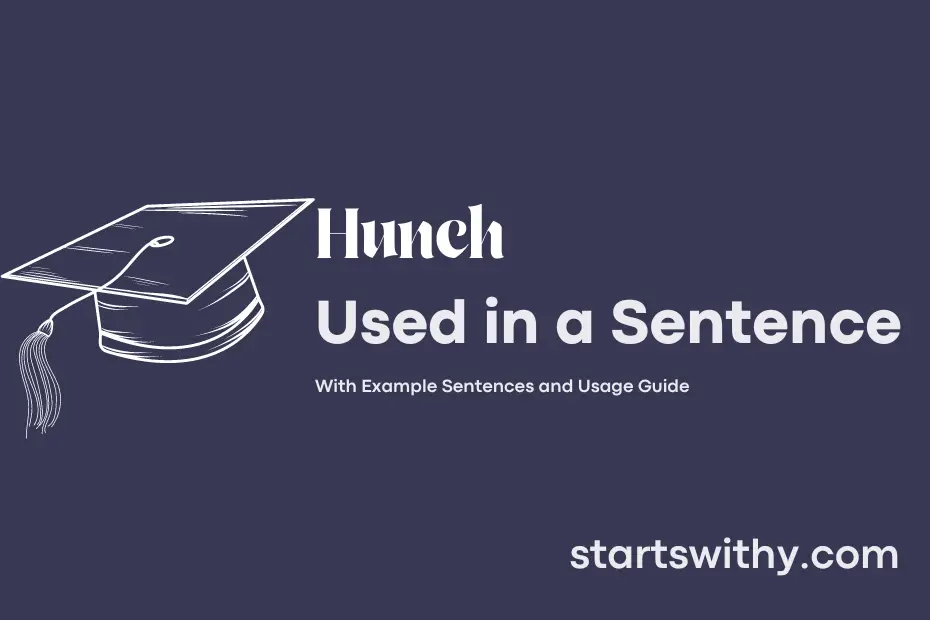Have you ever had a feeling about something without any evidence or logical explanation? This instinctual sense, known as a hunch, is a subconscious intuition that many people experience at some point in their lives.
A hunch is a gut feeling or a suspicion about something that arises without any concrete proof. It often serves as a guide or a prompt to consider a particular idea or course of action.
7 Examples Of Hunch Used In a Sentence For Kids
- I have a hunch that it will rain today.
- My hunch tells me that the answer is in the book.
- She followed her hunch and found her missing toy.
- I had a hunch that we would see a bird in the park.
- His hunch helped him choose the right path.
- My hunch says that the ball is under the table.
- We should trust our hunches and make the right decision.
14 Sentences with Hunch Examples
- When the professor mentioned a surprise quiz, I had a hunch that I should have studied more.
- I had a hunch that the canteen would be crowded during lunch break, so I packed my lunch from home.
- Whenever my roommate starts whispering on the phone, a hunch tells me she is gossiping about someone.
- I had a hunch that the deadline for the assignment was approaching, so I double-checked the submission date.
- Seeing a long line at the library, I had a hunch that there must be some important reference material available.
- I had a hunch that attending the seminar on career opportunities would be beneficial for my future.
- While chatting with my friends, I had a hunch that they were planning a surprise birthday party for me.
- Despite not receiving a formal email, I had a hunch that the class was canceled when I saw the empty lecture hall.
- I had a hunch that joining the sports club would help me stay fit and make new friends.
- When my classmate looked nervous before the presentation, I had a hunch that he needed some last-minute help.
- I had a hunch that the campus festival would be a great opportunity to showcase my artistic talents.
- During exam preparation, I had a hunch that focusing on the important topics would help me score better.
- I had a hunch that participating in the debate competition would improve my public speaking skills.
- Seeing the dark clouds gathering, I had a hunch that carrying an umbrella to college was a good idea.
How To Use Hunch in Sentences?
Using Hunch in a sentence is a great way to express a feeling of intuition or suspicion about something without concrete evidence. To use Hunch effectively, start by identifying the context in which you want to convey your hunch. For example, “I have a Hunch that it’s going to rain today,” implies a gut feeling about the weather.
Next, choose a word that suits the level of certainty you want to convey. Words like “feeling” or “belief” can emphasize that your Hunch is based on personal intuition, while words like “suspicion” or “sense” imply a bit more uncertainty.
To make your sentence more dynamic, consider adding additional information to support your Hunch. For example, “Based on the dark clouds forming overhead, I have a Hunch that a storm is approaching.”
Remember to pay attention to your tone when using a Hunch in a sentence. Depending on the situation, you can convey confidence by saying, “I have a strong Hunch,” or show hesitation with, “I can’t shake this nagging Hunch.”
Overall, using Hunch in a sentence is a subtle but powerful way to communicate your instincts or feelings about a situation. Practice incorporating it into your everyday language to express your innermost thoughts and feelings effectively.
Conclusion
In conclusion, a hunch is an intuition or feeling about something without clear evidence. It is a gut instinct that may guide our decisions or actions in certain situations. Hunches are often based on subconscious thoughts or past experiences, leading us to feel a sense of certainty without being able to explain why.
While hunches can be valuable in decision-making and problem-solving, it is important to remember that they are not always accurate or reliable. It is essential to balance intuition with critical thinking and evidence-based reasoning to make well-informed choices. Trusting your hunches can be beneficial, but verifying them through analysis and data can lead to more sound and successful outcomes.



